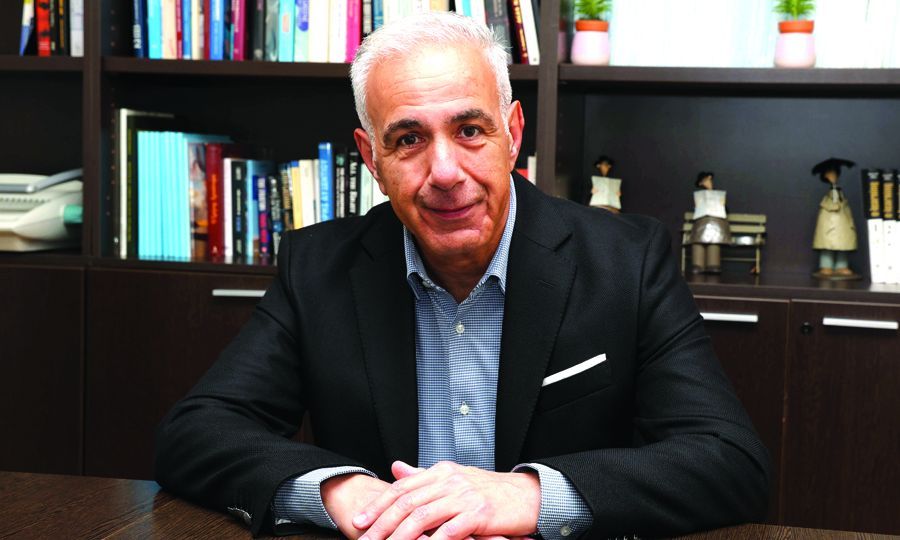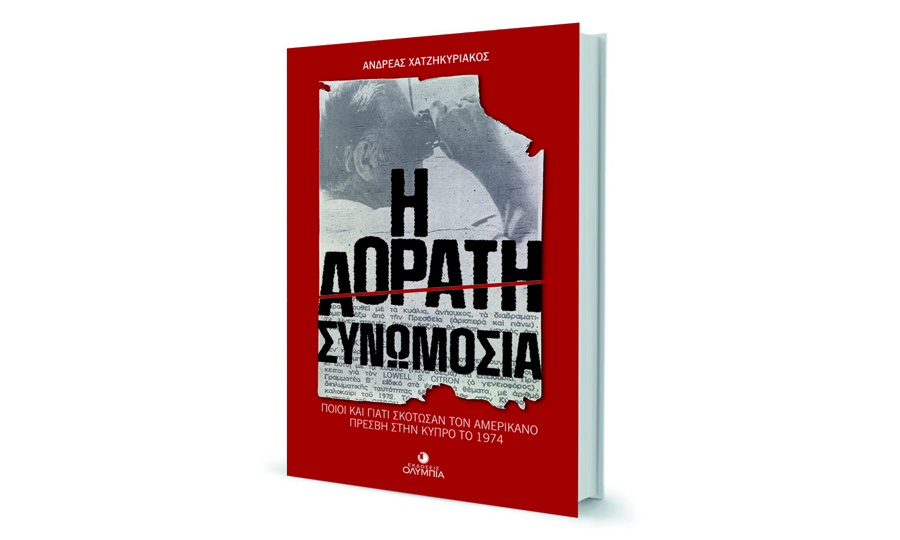
Newsroom
The tangled story behind the 1974 assassination of U.S. Ambassador Rodger Davies in Cyprus takes center stage in 'Invisible Conspiracy', the latest book by journalist and researcher Andreas Hatzikyriakos. In an interview with Marina Economidou, Hatzikyriakos discusses how, through extensive research and access to previously unseen documents, he pieces together the political climate of the time, revealing key players, hidden motives, and the human errors that helped shape history.
Why didn’t the U.S. fully investigate the assassination of one of its own diplomats? What roles did the EOKA B paramilitary group and the Greek military junta play? And how do ambition, cover-ups, and miscalculations alter the course of history? These are the questions Hatzikyriakos set out to answer.

"The story came to my door"
“When I finished my previous book, Flight CY284, I was already looking for a new challenge,” Hatzikyriakos explains. “That’s when journalist Costas Venizelos approached me with fresh information about Davies’ assassination. It felt like the story came knocking.”
At first, he didn’t expect to uncover much, certainly not the identity of the killer. But what began as a quest to understand what really happened evolved into a bigger picture. “We didn’t find out exactly who pulled the trigger, but we were able to identify who orchestrated the attack. That’s where the invisible conspiracy comes in.”
Why "Invisible Conspiracy"?
The title, he says, is a nod to Dimitrios Ioannidis, the Greek military strongman who continued to pull strings even after his official removal. “This was part of a broader plan, not just against Cyprus but also targeting Karamanlis in Greece and Clerides in Cyprus. If they couldn’t topple them, the goal was to bring them under control.”
Washington looked the other way
Perhaps the most shocking revelation is how little interest the U.S. showed in solving the murder.
“Back in Washington, the Nixon resignation and the chaos of Watergate dominated the headlines. Greek-American outrage was growing, and it was directed squarely at Henry Kissinger,” says Hatzikyriakos. “The last thing Kissinger wanted was for a diplomat’s assassination to become a political liability.”
Kissinger’s private conversations, featured in the book, reveal his personal concern over being blamed. “It became clear that the ambassador's death was politically inconvenient.”
Naivety and human error
The book also explores the idea that human misjudgment played a larger role than conspiracy alone.
“People forget that history is written by flawed individuals, people with fears, ambitions, and blind spots,” says Hatzikyriakos. “Why didn’t Ambassador Davies go to the secure bunker room in the embassy, a room he had used to protect his own children during a coup just a month earlier? He probably thought he could control the situation. That decision cost him his life.”
And it wasn’t just the ambassador’s miscalculation. “Everyone, from Makarios to the CIA, was caught off guard by the timing of the coup. Ioannidis deliberately misled them.”
New faces in power and Cyprus Police’s long-standing failures
The book also revisits lesser-known figures who stepped into leadership roles during that chaotic summer, including those who stayed in power until Glafkos Clerides reshuffled the administration in August 1974.
Another recurring theme is the historical failure of Cypriot authorities to investigate political crimes.
“The Cyprus police force has a legacy of incompetence going back to the 1960s,” Hatzikyriakos says. “Cases like the killings of EOKA fighters, the assassination of Polycarpos Yiorkatzis, and others were never solved. Our police inherited a British structure but quickly became politicized. By 1974, it was more interested in covering up crimes than solving them.”
One striking example: the same officer was put in charge of investigating both the Davies assassination and the later killing of Dorothy Loizou. “And what he focused on,” says Hatzikyriakos, “was how to destroy the crime scene.”
American neglect or cover-up?
While many point to a cover-up, Hatzikyriakos is more nuanced: “The word implies intent. I would say what the Americans did was gross negligence. Davies remains the only U.S. ambassador ever killed inside an embassy.”
Clerides in the Eye of the Storm
A central figure in the book is Glafkos Clerides, who took over after the invasion and coup.
“Clerides was, in my view, one of the few political figures who truly stepped up when the country was on fire,” Hatzikyriakos explains. “Makarios had fled, Grivas had died, and the country was in chaos. Clerides held it together, trying to strike a balance between the Makarios loyalists who distrusted him and the EOKA B faction who also didn’t trust him.”
His leadership wasn’t without flaws. “Yes, he made mistakes. But who wouldn’t under those conditions? He took the oath of office with tanks outside and the Turkish army in Kyrenia. Could he have refused the presidency? Maybe. But how many leaders have the courage to say no when everyone else is falling apart?”
Was Clerides ambitious? “Absolutely,” says Hatzikyriakos. “But name a politician who isn’t.”
Legacy of a forgotten assassination
At its core, Invisible Conspiracy is not just about political maneuvering or Cold War strategy. It’s about people, their choices, their egos, and their failures.
“I wanted to show how the human factor plays a huge role in shaping history,” Hatzikyriakos says. “Because no matter how grand the strategy, it’s always people, flawed, emotional, impulsive people, who carry it out.”
Upcoming Book Presentations:
May 22 – Larnaca: Social Welfare and Employment Centre. Speakers include Larnaca Mayor Andreas Vyras and journalist Sotiris Paroutis. Opening remarks by Interior Minister Konstantinos Ioannou.
May 28 – Paphos: Palia Ilektriki. Speakers include Paphos Mayor Phaidonas Faidonos and former House Speaker Yiannakis Omirou.
May 30 – Nicosia: PASYDY Amphitheatre. Speakers include Foreign Minister Constantinos Kombos and Professor Andreas Loverdos, former Greek Health Minister.
































